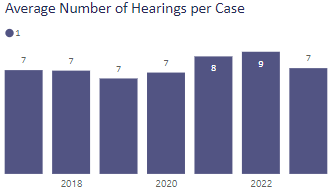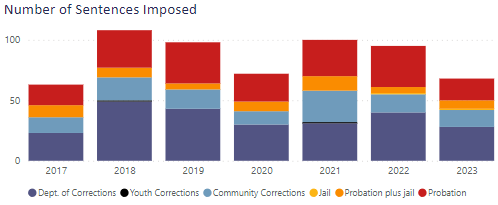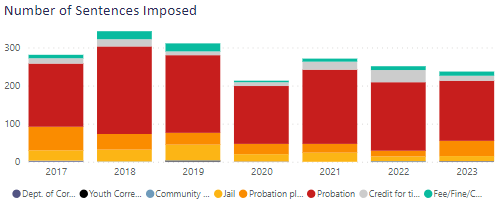Domestic Violence in Mesa County
Overview
In 2022 the District Attorney’s Office formed the Domestic Violence Response Team (DVRT). Through grant funding, we were able to bring on a Coordinator for this team that provides a more comprehensive look into complex Domestic Violence cases. DVRT is a multi-disciplinary team of Investigators, a specialized Domestic Violence Coordinator, Victim Specialists, Deputy District Attorneys, Paralegals, and other community partners. DVRT reviews domestic violence cases to provide additional investigation, risk assessments, and needs assessments to improve the overall continuity of care and quality of prosecution in Domestic Violence cases.
What is Domestic Violence?
Colorado Revised Statute §18-6-800.3(1) defines Domestic Violence as: "an act or threatened act of violence upon a person with whom the actor is or has been involved in an intimate relationship.” This definition also includes non-violent crimes “when used as a method of coercion, control, punishment, intimidation or revenge” against an intimate partner.
“Intimate relationship” means a relationship between spouses, former spouses, past or present unmarried couples, or persons who are both the parents of the same child regardless of whether the persons have been married or have lived together at any time.
In the state of Colorado, a police officer is mandated to arrest an individual if there is “probable cause to believe a crime of domestic violence was committed.”
Domestic Violence cases are part of the Victim Rights Act. As such, victims of Domestic Violence have specific rights that are afforded to them under the Colorado Constitution and Colorado statutes.
The Victim Rights Act ensures that crime victims are treated with fairness, respect, and dignity and that they are free from intimidation, harassment, and abuse. The VRA also helps to ensure that victims are informed of critical stages of the criminal justice process and that they may be present for, and heard, at certain stages as well. Additional information can be found at
https://dcj.colorado.gov/dcj-offices/victims-programs/crime-victim-rights-act-vra.
Case Resolution
In 2022, the District Attorney’s Office resolved 249 felony Domestic Violence cases. In 2023, 234 felony Domestic Violence cases were resolved. According to the graph below, the outcomes of felony Domestic Violence cases appear to be fairly consistent year to year.
Below is a breakdown of how felony Domestic Violence cases are resolving in our district:

*Plea dismissal- It is not uncommon for defendants to have multiple criminal cases going on at the same time. A defendant may be able to resolve such a situation by pleading guilty to some of the cases in exchange for other charges being dismissed. So, if a defendant pleads guilty to a case in exchange for the dismissal of two others, the case plead to would be categorized as plead guilty, whereas each of the cases dismissed would be categorized as “plea dismissals”.
In 2022, the District Attorney’s Office resolved 506 misdemeanor Domestic Violence cases. In 2023, 475 misdemeanor Domestic Violence were resolved. According to the graph below, the way misdemeanor Domestic Violence cases are resolved appears to be fairly consistent year to year.
Below is a breakdown of how misdemeanor Domestic Violence cases are resolving:

Timeliness
Felony Domestic Violence Case Resolution
The graph below shows the average number of hearings completed to resolve felony Domestic Violence cases. Since 2017, our trend shows a slight increase in the number of hearings to resolve these matters, going from 9 to 11. This upward trend is consistent with other felony charging numbers within the District Attorney’s Office.

Misdemeanor Domestic Violence Case Resolution
The graph below shows the average number of hearings completed to resolve misdemeanor Domestic Violence cases. The trend shows a slight increase in 2021 and 2022, however, the 2023 number shows a decrease back to an average of 7 hearings per case.

Domestic Violence Sentencing
Whether misdemeanor or felony, all Domestic Violence convictions require Domestic Violence treatment as directed by an evaluation, unless the sentence is prison. As demonstrated by the charts below, there are numerous sentencing options available and imposed on Domestic Violence cases, however, the possible consequences become more significant for felonies, with the addition of Community Corrections and prison as options.
Prison and Community Corrections are not sentencing options for misdemeanors. Consequently, rehabilitation and behavior change, not punishment, are the primary driving factors for misdemeanor sentencing. Once a Domestic Violence offender has three Domestic Violence convictions, habitual Domestic Violence charges could be filed.
Felony Domestic Violence Sentences

Misdemeanor Domestic Violence Sentences

Demographics


*These statistics do not account for unreported incidents.
Understanding that Domestic Violence offenders pose a community safety risk, the District Attorney’s Office is diligently reviewing this data to better resolve these cases in a swift and just manner. We work with our local law enforcement and DVRT Investigators to ensure Domestic Violence cases can be proven beyond a reasonable doubt. We work with DVRT attorneys, victim specialists, and paralegals to provide the best possible outcome for victim safety, offender accountability, and treatment. Through the collaboration between the DVRT and agency/community partners, the goal is to make informed and thoughtful decisions on when and how to best resolve Domestic Violence cases.